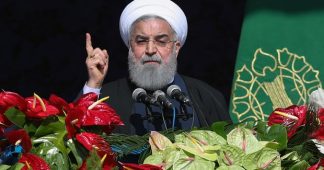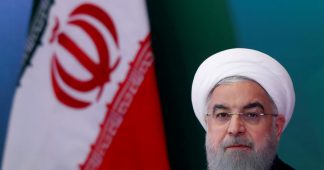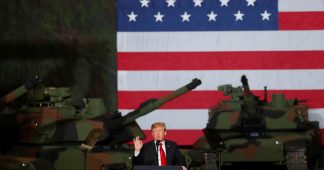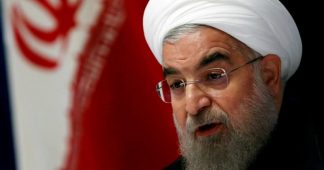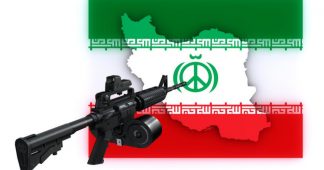By
27 August 2019
The biggest news to come out of this week’s G7 summit in France was President Donald Trump’s announcement that he is willing to meet with his Iranian counterpart.
That is causing alarm in Israel which may stop at nothing to sabotage any thaw.
G7 host President Emmanuel Macron had secretly invited Iranian foreign minister Mohammad Javad Zarif to the summit in Biarritz, an initiative to kickstart diplomacy.
“What I hope is that in coming weeks, based on these talks, we can manage to see a summit between President Rouhani and President Trump,” the French leader said.
Iran's active diplomacy in pursuit of constructive engagement continues.
Met @EmmanuelMacron on sidelines of #G7Biarritz after extensive talks with @JY_LeDrian & Finance Min. followed by a joint briefing for UK/Germany.
Road ahead is difficult. But worth trying. pic.twitter.com/oXdACvt20T
— Javad Zarif (@JZarif) August 25, 2019
Trump – who did not meet Zarif – nonetheless responded positively, saying Monday, “there’s a really good chance” he would meet with Iran’s President Hassan Rouhani.
Trump acknowledged that the sanctions his administration reimposed on Iran after the US reneged on the 2015 nuclear deal “are absolutely hurting them.”
Rouhani has poured cold water on meeting Trump before the lifting of US sanctions that are causing – as they are intended to do – intense suffering to ordinary Iranians.
“We are interested in solving problems in a reasonable way, but we’re not interested in taking photos,” Rouhani said in a televised speech.
“The key to changing the relationship is in Washington’s hands.”
Rouhani: “We’re not interested in photos. If someone wants to have their photo taken w/ Hassan Rouhani, it’s not going to happen. It’s possible with PhotoShop — but not in reality. Unless they remove all the sanctions — then there will be a new situation for us to consider.” pic.twitter.com/25CekHa6I3
— Golnar Motevalli (@golnarM) August 27, 2019
Something may already be in the works: Trump hinted that the US would be open to allowing other countries to provide credit to Iran secured by oil as a way for the country to meet urgent needs.
Trump pulled out of the nuclear deal last year and imposed devastating sanctions on Iran at the prodding of warmongering officials like his National Security Adviser John Bolton and Israeli Prime Minister Benjamin Netanyahu.
Israel’s Gulf allies, especially Saudi Arabia and the United Arab Emirates, have also been agitating for escalated confrontation with Iran.
Trump not seeking regime change
“US and Israeli planners despise Iran principally because it is an independent regional power,” analyst Greg Shupak wrote for The Electronic Intifada in June.
Iran diplomacy
Power Suits 27 August 2019
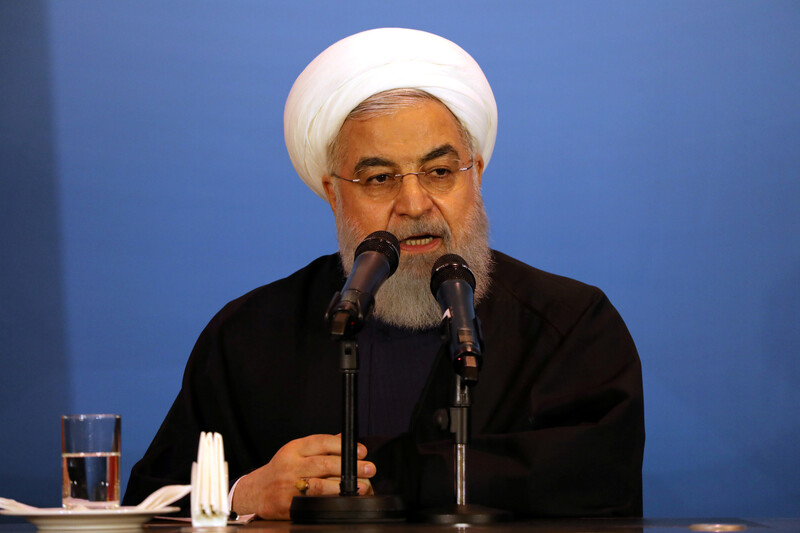
Reuters
The biggest news to come out of this week’s G7 summit in France was President Donald Trump’s announcement that he is willing to meet with his Iranian counterpart.
That is causing alarm in Israel which may stop at nothing to sabotage any thaw.
G7 host President Emmanuel Macron had secretly invited Iranian foreign minister Mohammad Javad Zarif to the summit in Biarritz, an initiative to kickstart diplomacy.
“What I hope is that in coming weeks, based on these talks, we can manage to see a summit between President Rouhani and President Trump,” the French leader said.
Trump – who did not meet Zarif – nonetheless responded positively, saying Monday, “there’s a really good chance” he would meet with Iran’s President Hassan Rouhani.
Trump acknowledged that the sanctions his administration reimposed on Iran after the US reneged on the 2015 nuclear deal “are absolutely hurting them.”
Rouhani has poured cold water on meeting Trump before the lifting of US sanctions that are causing – as they are intended to do – intense suffering to ordinary Iranians.
“We are interested in solving problems in a reasonable way, but we’re not interested in taking photos,” Rouhani said in a televised speech.
“The key to changing the relationship is in Washington’s hands.”
Something may already be in the works: Trump hinted that the US would be open to allowing other countries to provide credit to Iran secured by oil as a way for the country to meet urgent needs.
Trump pulled out of the nuclear deal last year and imposed devastating sanctions on Iran at the prodding of warmongering officials like his National Security Adviser John Bolton and Israeli Prime Minister Benjamin Netanyahu.
Israel’s Gulf allies, especially Saudi Arabia and the United Arab Emirates, have also been agitating for escalated confrontation with Iran.
Trump not seeking regime change
“US and Israeli planners despise Iran principally because it is an independent regional power,” analyst Greg Shupak wrote for The Electronic Intifada in June.
“It has a strong military and a foreign policy that includes providing material support for armed Palestinian resistance to Israel and for Hizballah’s defense of Lebanon from US-Israeli aggressions.”
Yet this does not mean the US will necessarily always give Israel a free hand.
Despite the Trump administration’s virtually unconditional embrace of Israel, there have been hints of tension between the two allies: The Pentagon is admonishing Israel for recent air attacks against Iranian-supported militias in Iraq.
Whether Trump’s willingness to deal differently with Iran reflects anything more than one of his habitual mood swings remains to be seen.
It is notable however that Trump has said regime change in Iran is not his policy.
“We’re not looking for leadership change, we’re not looking for that kind of change,” Trump said at his joint press conference with Macron on Monday.
“This country’s been through that many times before. That doesn’t work.”
This view is at sharp odds with advisers like Bolton who definitely want the US to pursue the kind of catastrophic regime change in Iran that Washington has been pursuing for decades all over the globe.
Israeli alarm
What is not in doubt is Israel’s alarm at the chance of any warming between the US and Iran.
Israel is alarmed by possible U.S.-Iran talks within weeks – my story on @newsisrael13 and @axios https://t.co/oOHk07XHwr
— Barak Ravid (@BarakRavid) August 26, 2019
“Israeli officials tell me the prospect of renewed talks between the US and Iran has been discussed by Israel’s security cabinet several times lately,” Israeli journalist Barak Ravid reported.
“We have no interest in talks between the US and Iran, but our ability to influence Trump or confront him on this issue is pretty limited,” an unnamed Israeli cabinet minister told Ravid.
“We were very lucky that until now the Iranians rejected all of Trump’s proposals for talks,” another senior Israeli official said.
Ravid speculates that a Trump-Rouhani meeting could take place at next month’s UN General Assembly in New York.
“Trump, Rouhani and Macron are all expected to attend,” he notes. “Netanyahu, meanwhile, might not be at the annual meeting because it falls 10 days after Israel’s elections.”
Trita Parsi, a longtime proponent of US-Iran diplomacy who is now with the Washington think tank the Quincy Institute, suggested that Israel was stepping up its bombing attacks in the region in order to scupper such talks.
This might explain Israel's recent escalation in bombing Lebanon, Syria and Iraq.
If Iran responds, the confrontation will all but kill the prospects of Trump-Rouhani diplomacy… https://t.co/ROb1UVF8OO
— Trita Parsi (@tparsi) August 26, 2019
“This might explain Israel’s recent escalation in bombing Lebanon, Syria and Iraq,” Parsi observed. “If Iran responds, the confrontation will all but kill the prospects of Trump-Rouhani diplomacy.”
Israel may “foment chaos”
That view is backed by Israeli analyst Amos Harel who says Trump’s readiness to talk to the Iranians would be a “strategic change in direction” entirely at odds with Israeli policy.
According to Harel, Netanyahu hoped that US withdrawal from the nuclear deal “would lead to harsh sanctions followed by a renewed deterioration in Iran’s economic situation (as did in fact happen), and later, even to the collapse of the regime – or Iranian surrender to the tough dictates of the West regarding a new nuclear agreement.”
But, Harel adds, “these hopes are not coming true.”
Netanyahu’s effort to counter Trump’s diplomacy, Harel warns, may be “to foment chaos throughout the Middle East.”
Perhaps there’s no stronger evidence that Israel thrives on division and conflict than its reaction to prospects for renewed diplomacy between Washington and Tehran.
If such diplomacy stands any chance, it will have to survive what is sure to be a full-scale and dangerous assault from Israel and its American lobby.
Published at https://electronicintifada.net/blogs/ali-abunimah/israel-may-sow-more-chaos-thwart-us-iran-diplomacy

